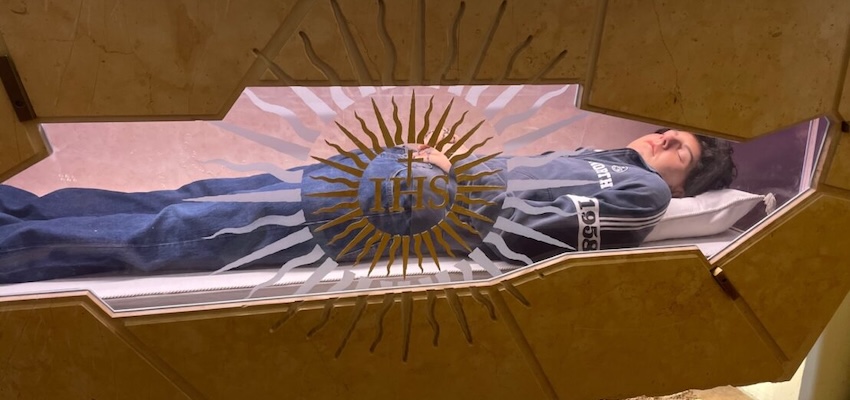
I write these words on pilgrimage in the beautiful Italian town of Assisi, home to Sts. Francis, Clare, and now, since September 7, Carlo Acutis. The images of Francis and Clare are taken from frescoes and paintings. Their writings and letters come from historical sources. In the case of Carlo, the images of him come from photos and videos, while his sayings and wisdom come from what he wrote in his diaries and what he told his parents and friends. Francis and Clare are pictured in their religious habits, while Carlo’s body—lying in a glass casket—is dressed in denim.
Since his canonization, young people have been curious to know more about this young man, who challenged stereotypes of who can be a saint and why. Here lies an ordinary kid who loved computers, was committed to his friends, and who had a heart of mercy for all. Although he did not come from a devoutly religious family, he was gifted with wisdom and faith that surpassed his years and experience. Acutis served as an example of living a beautiful and selfless contemporary life. If God raised up this young Italian boy to be a saint of the third millennium, is it possible that his plans for my life are much greater and dangerous than I imagine?
Consider his advice: “All people are born as originals but many die as photocopies.” Here, Carlo warns against the slavery of conformity. But he did not champion radical individualism. For Carlo, the highest good was God. “Sadness is looking at ourselves, happiness is looking towards God.” He also shared: “Money is only ragged paper . . . what counts in life is the nobility of the soul, that is, the way that one loves God and loves one’s neighbor.” His clarity of vision, powerful in its simplicity, encourages young people not to settle for something beneath their dignity or to pursue goods that fail to satisfy the longings of the human heart. His was a call not to stifle the hope in young hearts.
Carlo also used his computer skills to update and develop the websites and communication platforms for his parish and school, opening up new ways to evangelize and share the Good News. But he was not naive about the dangers of the internet, and warned his fellow students about the evils of pornography, which “hypnotizes” its victims and dehumanizes both its producers and consumers.
From a young age, Carlo grasped Jesus’s teaching about how our inner disposition is the key to what we say and how we act. He knew that a deep and beautiful inner spirituality is the secret to having a serene, consistent, and joyful outward disposition. Carlo often repeated: “Why do people worry so much about their physical beauty but don’t worry about the beauty of their souls?” Carlo exemplified this beauty. He helped immigrants, beggars, the disabled, the elderly, and was a good friend to those his own age whose parents had separated.
Another distinct feature of Carlo’s young life was his love for the Eucharist. At a time when many of his contemporaries were walking away from the Mass, Carlo found in it a truth and a divinity that attracted him. For Carlo, the Eucharist was a threshold experience that enabled him to transcend the border of this world. He famously remarked: “The Eucharist is my motorway to heaven” and that “with each Communion we come closer to the goal of sanctity.”
Carlo Acutis died after a short illness caused by acute leukemia. He faced his death with great courage, as did his suffering parents. Though they prayed for the miracle of his survival, they all came to realize that God doesn’t always save us from death but in death.
Although the lives of Francis, Clare, and Carlo are separated by nearly eight centuries, all three are windows through which we see the triumph of God’s grace at work in human lives. The recent canonization of Carlo reminds us that God is still calling people to be saints. Is God calling me to be a saint? In the words of Léon Bloy, the only tragedy in life is not to become one.
The Church’s Answer to the World (ft. Carter Griffin)
In the latest installment of the ongoing interview series with contributing editor Mark Bauerlein, Fr. Carter Griffin…
Undermining the Church’s Public Witness
Bishop Thomas J. Paprocki recently wrote in these pages that the Archdiocese of Chicago’s plan to grant…
The Lost Art of Saying “No”
Conservative pundit Matt Walsh recently contended that “we have to recapture the long-lost art of saying ‘no.’”…
